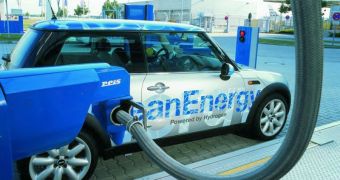One of the problems related to implementing hydrogen technology in today's cars, aside the relative low efficiency of fuel cells, involves the fuel itself - hydrogen, a gas, the lightest element known in the universe and at the same time the most abundant. After more than 13.7 billion years, hydrogen still makes up for more than 75 percent of the whole mass of ordinary matter. Hydrogen may be abundant and light, not to mention that it does not pollute the environment, but it is also hard to compress and store.
Most of the approaches used to solve this problem usually resort to absorbing hydrogen into substances that remain stable in normal atmospheric conditions, but release hydrogen while being subjected to high temperatures. A team of researchers from the Leibniz Institute of Catalysis have recently created a method of hydrogen extraction from formic acid without the need to input high-energies. The formic acid can generate hydrogen at room temperatures, which can then be introduced directly into the fuel cell devices.
The hydrogen extraction method developed by the Leibniz Institute of Catalysis research team involves placing formic acid (HCO2H) in the presence of amine and a catalyst - ruthenium phosphine complex - so that it is converted into carbon dioxide and hydrogen without any other energy input. The gas is then filtered to remove the carbon dioxide gas, while hydrogen is pumped into the fuel cell. Formic acid is nontoxic, can be easily stored, since it is liquid, and can be created through a catalytic reaction from carbon dioxide, thus the carbon dioxide gas released during hydrogen conversion is neutral and noncumulative.
Although the new hydrogen conversion method has direct implications in the car industry, it will probably take a while before it is implemented, due to the fuel cell efficiency problems. Meanwhile it could be used to power much less energy intensive devices. "For the use of fuel cells in portable electrical devices, this nascent formic acid technology opens up new possibilities in the short term", said Matthias Beller, part of the research team.

 14 DAY TRIAL //
14 DAY TRIAL //